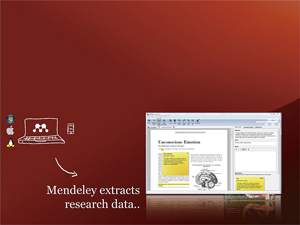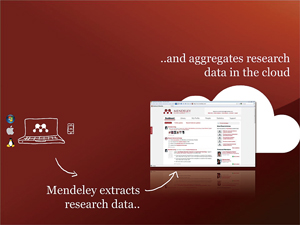Naoki Sakiyama
(Chiba University)
● The future of scholarship
In December 2011 Victor Henning , the CEO of Mendeley, was invited to speak at Chiba University at our Academic Link seminar on “The future of research and learning being carved out by new reference management technologies.” I took part in a discussion in the second half of the seminar, tossing out some basic questions from the standpoint of a researcher in the humanities. I also contributed a brief article to the email magazine Digital Humanities Monthly No. 61 explaining the influence of Mendeley on the humanities.
My high expectations for Mendeley can be summed up simply in the following three points.
| (1) |
Development of new routes for distribution of academic information
I am particularly hopeful that the distribution of academic information written in Japanese will be expanded. |
| (2) |
The visualization of research activities by different indicators than those used up to now
Mendeley indicates the “readers” and “attributes” (occupation/field/geographical location) for registered papers. The data provided by Mendeley may eventually come to replace the current impact factors. It has been noted that especially in the humanities, the impact factors are unable to reflect the actual research situation adequately, whereas the data collected and shown by Mendeley may be more useful as indicators for assessing research. |
| (3) |
Prompting of information exchange among researchers
Discussions premised on bibliographic data or research papers themselves are important functions of the academic and research societies. Lately, however, as scientists find themselves with less time to devote to research, academic and research society activities are at a low level. It is quite possible that the SNS features of Mendeley will come to replace part of the role that academic and research societies have played up to now in exchange of academic information and discussions based thereon. |
In addition to these kinds of roles, software like Mendeley should be able to contribute to the issue of rebuilding the relationship between science and society, which has come to the fore since the March 11, 2011 disaster. Academic papers and other scholarly information produced by scientists are not meant to be the sole property of scientists alone. At the same time, however, all due care must be exercised in their interpretation and handling. A need is seen for tools that support the sharing of data between scientists and the public and the carrying out of discussions based on the shared data. In particular, there is likely to be growing importance attached to the development and spread of software that, while supporting the trend toward open access to scholarly papers, also enables that information to be handled efficiently and accurately.
● Current state of the humanities―focus on history
Unfortunately the situation in the humanities with respect to digital archiving of information is less than stellar. It is true that the emergence of the digital humanities, aimed at innovation through utilizing of computers for investigations, research, and education in the various fields of the humanities and sciences, has been astonishing. Through the use of text analysis techniques, GIS, and multimedia, it has become possible to analyze data on a much larger scale than previously; and changes have come about also in the ways of presenting the analytical data. This is little more than a tempest in a teapot, however, as it has scant relevance for most researchers. Here let us refer to a survey by Matsubayashi et al. on the situation for researchers in the field of history.2 The survey analyzed various aspects of information collection by these researchers for carrying out their work, and showed the lag in support for digital data. Look, for example, at the item on extent of e-journal use. In my own field, history of the Western world, I have more occasions to reference overseas research trends than people in other fields and believe my use of e-journals is also high. In the survey conducted in 2007, however, around 30 percent of researchers in this field responded that they had never used e-journals. In the field of Japanese history, where use of digital data has advanced the least of all, that figure was more than 44 percent. The reasons for this are quite simple. According to Matsubayashi's survey, in every field of history, more than 60 percent of respondents (including both those who had used e-journals in the past and those who never had) gave “Paper is easier to read” as the reason why they don't use e-journals, and more than half said there were no e-journals among the publications they wanted to read. Other researchers in the field of history said they were satisfied with the present situation and felt no need to change the way things are. On the other hand, if the situation changed such that the necessary journals were available in digital form and they were easier to handle than paper, this would probably become preferable to the current way of doing things. As pointed out in the summary, the key to improving the situation will be the availability in digital format of historical materials, scholarly works, and university research bulletins. In reality, compared to 2007 when the survey was conducted, the provision of information infrastructure for research in the field of history has progressed at a rapid pace. In the field of Western history, for example, through Web services such as Google Books and Europeana it has become possible to download historical materials that were very difficult to access previously. In the fields of Japanese and Asian history, the number of available historical materials is increasing as resources including the digital archive of the Japan Center for Asian Historical Records and the Digital Library from the Meiji Era of the National Diet Library have been established. University research bulletins have also become more convenient to use thanks to the provision of repositories by individual universities and improvements to the CiNii database service.
● The advantages of Mendeley
The digital archiving of information has increased exponentially the amount of data available to individual researchers. Meanwhile, with the provision of metadata, DOI, and the like, the search is on for methods based on these for managing not only books and journals but also historical materials. The introduction of reference management software is becoming essential for linking this growth in information volume to research progress. A problem, however, is that reference management software such as EndNote tends to be expensive, so that it is difficult to recommend without hesitation to researchers let alone students.
What caught my attention in this situation is Mendeley. The advantages of Mendeley include (1) its multi-OS support, (2) its being essentially free software, (3) the ease of extracting bibliographic data from existing research paper databases, (4) ease of interchange with other software thanks to its support for BibTex format, and (5) its support for Web and mobile environments enabling data to be saved to cloud storage space. From an educational standpoint, these conditions are applicable to a wide range of users, there are many situations in which the software can be used, and the software rates high on the usability scale.


Source: Victor Henning (2011) 2nd SPARC Japan Seminar 2011, http://www.nii.ac.jp/sparc/event/2011/pdf/2/1_henning.pdf
The biggest feature of Mendeley, information sharing, is subject to limitations due to the stringent copyright restrictions in Japan. When used for classes in higher learning institutions, however, the copyright restrictions are relaxed, enabling scholarly papers and materials to be shared. Maximum use of this sharing functionality is allowed particularly in a learning situation based on group work. Naturally Mendeley is not intended only for use in education. It is a highly useful tool for research in the humanities and for joint research in particular. In joint research, it is important above all to carry out the research while sharing information with the rest of the team. Geographical and time constraints, however, can make it difficult to gather all the members under one roof for information exchange. Up to now mailing lists have been used for information exchange and discussions, but the limits on volume of information that can be sent at one time and the archiving of discussions are among the problems with this approach. Mendeley lets users share annotations made on a PDF file, for example, and discussions in the group can be stored on Mendeley Desktop, for ease of giving feedback on individual research. Even so, Mendeley still has plenty of room for improvements. One area is assistance with making citations from Japanese bibliographic data. The cause of this is that no standardized Japanese research paper style has been drawn up, making it a problem not just for Mendeley but for the Japanese academic world in general, and one that must be overcome for the sake of encouraging the flow of scholarly information.
References
| 1. |
Naoki Sakiyama. “Mendeley workshop and the impact on the humanities.” Digital Humanities Monthly. No. 6, 2012.
http://archive.mag2.com/0001316391/20120127213404000.html
Reference: Chiba University Academic Link Center Seminars. http://alc.chiba-u.jp/seminar/report006.html |
| 2. |
Mamiko Matsubayashi, Hiroyuki Okano. “Information behavior patterns of researchers in humanities based on user surveys for researchers in history and Japanese literature.”
Research Center for Knowledge Communities Monograph Series, University of Tsukuba Research Center for Knowledge Communities. No. 4, 2010.
http://www.kc.tsukuba.ac.jp/monograph/monograph04.pdf |
|

